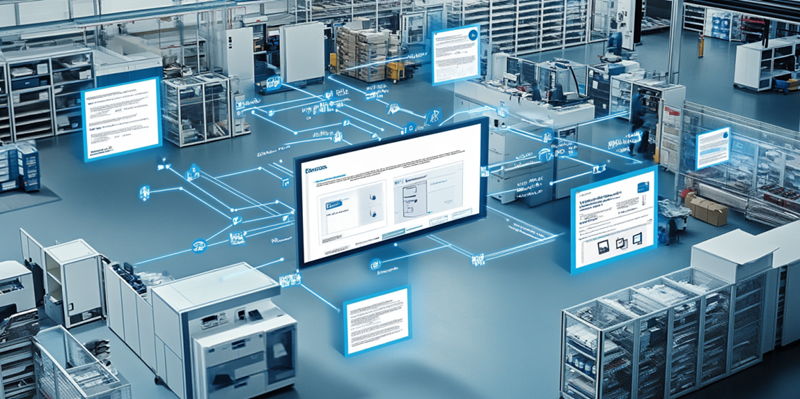In today’s digital-first world, effective management of vast amounts of data is crucial for businesses of all sizes. However, the traditional methods of document storage often lead to confusion, inefficiencies, and lost opportunities due to scattered data. MetaDocs, a robust Document Management System (DMS), offers an innovative solution by centralizing all documents into a single, secure location. By creating a "single source of truth," MetaDocs ensures that accurate and up-to-date information is easily accessible to users. Centralization eliminates the chaos associated with disorganized document storage, paving the way for more efficient and streamlined operations.
MetaDocs not only centralizes documents but also enhances them with metadata, which adds context and depth to the stored information. Metadata facilitates advanced search capabilities, enables quick retrieval of documents, and significantly improves data accuracy. This feature reduces time spent on manual processes, thus streamlining workflows and boosting overall productivity. Additionally, MetaDocs links documents to related information, offering a holistic view of business operations. This interconnected approach allows for seamless association of contracts with customer profiles, project documentation with timelines, and invoices with purchase orders. By integrating these elements, MetaDocs aids in project management, progress tracking, and data-driven decision-making.
Centralized Storage and Metadata Utilization
One of the standout capabilities of MetaDocs is its ability to centralize all documents into a single, secure repository. This centralization creates a dependable "single source of truth" that ensures the information employees rely on is both accurate and up-to-date. Traditional document storage solutions often suffer from fragmentation, with files spread across multiple systems and locations. This dispersal leads to inefficiencies and increases the likelihood of errors. MetaDocs eliminates these issues by consolidating data, making it easier for users to locate and access the documents they need.
Moreover, MetaDocs enhances document organization by utilizing metadata, which provides additional context to stored information. Metadata, essentially data about data, enables more advanced search functionalities, allowing users to find documents quickly and efficiently. This feature not only improves data accuracy but also significantly reduces the time employees spend searching for files. By implementing a system that automatically tags documents with relevant metadata, businesses can streamline their workflows and reduce the burden of manual data entry.
Another important aspect of MetaDocs is its ability to link documents to related information, creating comprehensive associations within the system. For instance, contracts can be directly linked to customer profiles, project documents can be associated with specific timelines, and invoices can be tied to corresponding purchase orders. This level of interconnectedness provides a holistic view of business operations, making it easier for employees to track progress and make informed decisions based on all relevant data.
Enhanced Efficiency and Compliance
The adoption of MetaDocs leads to increased efficiency by significantly reducing the time spent searching for documents. In a traditional system, employees might waste considerable time locating files scattered across various locations. MetaDocs’ centralized storage simplifies this process, enabling users to find the documents they need with minimal effort. This increase in efficiency not only saves time but also allows employees to focus on more important tasks, ultimately improving overall productivity.
Moreover, MetaDocs ensures compliance with industry regulations, which is essential for businesses operating in highly regulated sectors. The system’s robust security features protect sensitive information, ensuring that documents remain secure and confidential. Additionally, MetaDocs provides audit trails, which track document access and modifications, thereby ensuring transparency and accountability. These features help businesses stay compliant with regulatory requirements and avoid potential legal issues.
Furthermore, MetaDocs enhances collaboration by providing centralized access to documents. Team members can easily share and collaborate on files, regardless of their location. This level of accessibility fosters better communication and teamwork, leading to more effective project management and smoother workflows. By centralizing data and making it more accessible, MetaDocs not only improves efficiency but also empowers employees to work more collaboratively.
Achieving a Competitive Edge
In today’s digital age, managing extensive data is essential for businesses of all sizes. Traditional document storage methods often result in confusion, inefficiencies, and missed opportunities due to fragmented data. MetaDocs, a powerful Document Management System (DMS), presents a modern solution by centralizing all documents in a single, secure place. By establishing a "single source of truth," MetaDocs guarantees that accurate, up-to-date information is readily accessible. This centralization eradicates the disarray of disorganized storage, leading to more efficient and streamlined operations.
In addition to centralizing documents, MetaDocs enriches them with metadata, providing added context and depth. Metadata enables advanced search capabilities, prompt document retrieval, and enhanced data accuracy. This functionality reduces the time spent on manual tasks, streamlining workflows, and boosting productivity. Furthermore, MetaDocs links documents to related data, providing a comprehensive view of business operations. This interconnected system integrates contracts with customer profiles, project documents with timelines, and invoices with purchase orders, enhancing project management, progress tracking, and data-driven decision-making.

